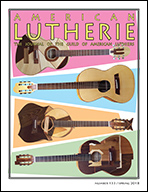|
||||
| Letters from our readers Do finely-sanded guitar tops actually sound different from the usual ones? An experienced luthier writes in to aver that they do. Another writer talks with first-hand knowledge about Robert Bouchet’s earliest guitars. |
||||
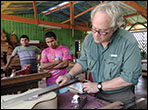 |
In the Footsteps of Mangore by Federico Sheppard There are luthiers way up in the tributaries of the Amazon River. They have wood galore, and they are teaching large numbers of local kids to make their own instruments. But they are short on good sharp tools and modern information. Our intrepid adventurer Federico Sheppard sets out to address that lack by bring in donated tools and holding master classes. He was multi-tasking; on the same trip he researched and commemorated the 1931 visit of Agustin Barrios to the remarkable Teatro Amazonas, which you might recognize from the Werner Herzog movie Fitzcaraldo. And he got in some fishing. |
|||
 |
Meet the Maker: Mark French by R.M. Mottola Mark French was a kid who took guitar lessons and paid the guy at the music store to change his strings. He went on to be an aerospace engineer, but with all that book learning he still did not know how guitars worked. Now he teaches college courses on guitar making and hangs out with captains of industry at Fender and Taylor. |
|||
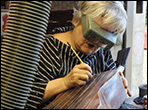 |
Restoration of a Guitar by Thomas Duran made in Seville in 1684 by D. and F. Sinier de Ridder So you need to restore a guitar that is a third of a millienium old. Of course it was originally a Baroque guitar. A couple hundred years ago somebody chopped it into a Romantic-era 6-string guitar. No prob, you’ll just find a similar authentic Spanish-made instrument for a guide. Except there aren’t any. Spain was packed with them 300 years ago, but now not a single one is known to exist in original condition. Nonetheless, a full and successful restoration is made. |
|||
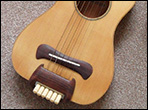 |
Travel Guitar with In-Body Tuning System by John Armstrong Many different designs have addressed the problem of making a travel guitar with a full scale length. Here’s one that solves the problem by completely redesigning the tuning mechanism so that it can fit into the body behind the bridge. |
|||
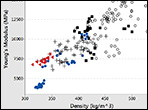 |
More Stiffness and Density Data for Lutherie Woods by James Blilie We all have ideas about the stiffness of brace wood, probably based on a combination of intuition, hearsay, and informal flexing. Blilie aims to accumulate more quantitave data. Here he reports on his latest tests. He also describes his methodology and the reasoning behind it. This is Blilie’s third article on this topic. |
|||
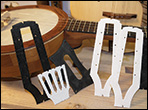 |
Some Thoughts on CAD and 3D Printing for Luthiers by Edmond Rampen
OK, we are probably some distance yet from pushing a button and 3D-printing a functioning guitar. And if you think that something about that sounds kinda creepy and disappointing, you just might be a luthier. But what we are talking about in this article is entirely different: Using surprisingly inexpensive printers to make templates, tools, and parts for guitars. The future is here, people. Get into this while you wait for your hover car. |
|||
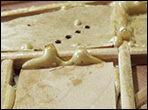 |
What Were They Thinking?
by Fred Casey We’ve all see bad repairs. They can be frustrating, or maybe enraging. But sometimes they are just dazzling in their spectacular daring and ignorance. Here’s a couple of those. |
|||
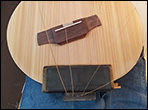 |
The Pretty Good Setup Tailpiece
by Jay Anderson Here’s a simple device that lets you string, play, and set up a flattop guitar before you glue the bridge on. |
|||
| Business Tips For The Repair Shop by Paul Neri Good, simple advice on how to keep your repair customers happy from a guy with decades of experience. |
||||
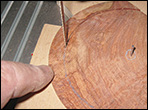 |
It Worked for Me by James Blilie, Rodney Stedall, Fred Casey, and Ed Smith Make a simple work board to cut nice round burl rosettes on a bandsaw. Sand perfect angles on the nut end of peghead laminations. Place rare-earth magnets for crack repair inside acoustic guitars the easy way. Use the truss-rod slot in a neck for a simple holding jig. |
|||
| Reviews: Cuzzucoli and Garrone’s Classical Guitar Design by Juan Oscar Azaret This big new book, written in Italian, is available in English. It’s got some math in it. (Insert your own joke here about still being in an incomprehensible language.) Our reviewer finds a lot of value in it, which he explains in some detail. |
||||
| Questions edited by R.M. Mottola Sources for specialty adhesive tapes; more about the Bridge Doctor device; source of plastic rulers; sharpening scalpels; thoughts about short-scale guitars; trouble with hide glue raising soundboard grain around a bridge. |
||||
Web Extras |
||||
| Top of Page | ||||

